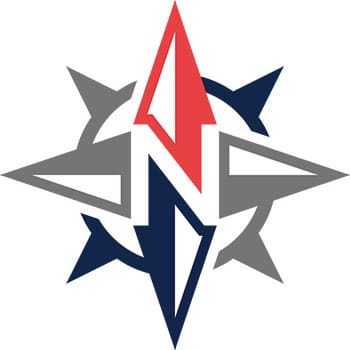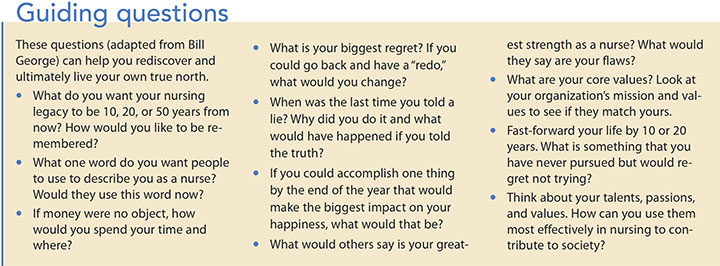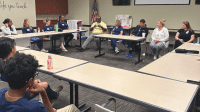Rediscover your authentic self and regain your moral compass.
By Rose O. Sherman, EdD, RN, NEA-BC, FAAN, and Tanya M. Cohn, PhD, MEd, RN
Takeaways:
- Your moral compass keeps you on a track that’s congruent with your values, beliefs, and sense of purpose.
- Your authentic self is who you are as an individual—your interests and views on certain topics—but it also matters professionally.
- Knowing what’s nonnegotiable and staying present and engaged will lead to meaningful work and help you find your authentic self.
 Rachel works in critical care and had been with the same employer for 8 years. Another health system in her area offered a $15,000 sign-on bonus for experienced nurses. She interviewed with the system and accepted the position. She rationalized that the $15,000 bonus would compensate for some of the concerns she had about her new employer. Now, she’s unhappy and feels trapped; the culture and lack of professionalism aren’t congruent with her values. Nurse turnover in the intensive care unit (ICU) is very high, and little opportunity exists to participate in any shared governance. She finds herself becoming disengaged from the profession that she once loved. Rachel feels that she’s lost direction; she never considered that a work environment could have such a profound impact on her.
Rachel works in critical care and had been with the same employer for 8 years. Another health system in her area offered a $15,000 sign-on bonus for experienced nurses. She interviewed with the system and accepted the position. She rationalized that the $15,000 bonus would compensate for some of the concerns she had about her new employer. Now, she’s unhappy and feels trapped; the culture and lack of professionalism aren’t congruent with her values. Nurse turnover in the intensive care unit (ICU) is very high, and little opportunity exists to participate in any shared governance. She finds herself becoming disengaged from the profession that she once loved. Rachel feels that she’s lost direction; she never considered that a work environment could have such a profound impact on her.
Rachel’s dilemma isn’t uncommon. Many of us at some point in our careers have been in an organizational culture that wasn’t in line with our values. When this happens, we experience cognitive dissonance or discomfort, knowing that we’re not being true to our authentic selves. Bill George, a well-known researcher on this topic, describes this as losing direction or veering from our “true north.”
George defines true north as our moral compass. Much like a literal compass that points us in the geographic direction we want to travel, our moral compass keeps us on a track that’s congruent with our values, beliefs, and sense of purpose. When you lose your true north, like Rachel has, you feel as though you’re drifting. Regaining your moral compass involves rediscovering your authentic self.
Finding your authentic self
Simply stated, finding your authentic self means finding and being yourself. Often we view this as who we are as individuals—our interests and views on certain topics—but finding your authentic self also matters professionally. This means that as you pursue a career path, you must reflect on what matters to you and that your job choice should mirror your beliefs and values. To find your authentic self, you must be willing to set individualized boundaries that you won’t allow to be compromised by outside or societal pressures. When you maintain these boundaries, you set yourself up for finding and achieving a consistent authentic self.
Always ask yourself whether something, such as having an opportunity to participate in the shared governance of your unit, does or does not matter to you. This keeps your nonnegotiable values and beliefs in the forefront of your mind. For Rachel, this clearly includes a culture of shared governance. In addition to being cognizant of nonnegotiable values and beliefs, finding your authentic self includes being in the moment. If you’re able to find your authentic self, you’ll not only stay true to who you are, but you’ll also be engaged and in the moment. So, it’s not a surprise that when Rachel’s nonnegotiable values and beliefs were compromised she stopped being present and engaged.
Knowing what’s nonnegotiable and staying present and engaged will lead to meaningful work and help you find your authentic self. As nurses, this is crucial to caring and advocating for our patients with compassion. Furthermore, finding and being your authentic self strengthens your voice within the profession.
Living your own true north
When you experience lack of coherence between your authentic self and your current professional life, such as Rachel is experiencing, take the time to discover your own true north. You can do this through self-reflection. Bill George recommends using guiding questions. (See Guiding questions.)

Asking these questions before making a decision can provide guidance about what matters most to you and what your next steps should be to get back on track. Through self-reflection, Rachel may discover that the short-term monetary gain of the sign-on bonus results in long-term losses in her professional career.
Getting back on track
Rachel is experiencing an erosion of authenticity and needs to get back on track. Luckily, she can.
First, Rachel needs to take a step back and examine her values and beliefs as an individual and nurse, and determine the negotiability of each. After that, she can consider what contributes to or hinders her ability to be in the moment so that she can maintain professionalism and provide the best care for her patients.
Next, Rachel should determine if the elements that make up her authentic self and her work environment are in alignment. She’s experiencing a disconnect between her value of shared governance and professionalism with the organization’s values, resulting in disengagement. To get back on track, Rachel can either make another job change or seek out leadership and peer support for change within the organization. Though both of these options might feel daunting, not taking action will only result in Rachel losing more of her authentic self.
Last, Rachel must share her values and beliefs, even if it makes her feel vulnerable. Finding the inner strength to voice her values and beliefs, drawing boundaries around what can and can’t be compromised, and being vulnerable will lead her back to her authentic self. If Rachel chooses to stay, she may need to become a voice for change by paving the path for shared governance. By making this decision, Rachel may indirectly help others find their own authentic selves and help to change the high ICU turnover.
Let your compass guide you
Rachel’s true north can serve as a fixed point in an often chaotic world. Money, as she has learned, can be seductive, but it carries a price. Because her true north is derived from her most deeply held values, beliefs, and principles, it can serve as her internal compass to help guide her when her values are tested.
Return to your true north when you encounter changes and challenges. It can serve as a guide to help you determine if your current role is still congruent with your authentic self. When it’s not, your true north can help pull you back.
Rose O. Sherman is a professor of nursing and director of the Nursing Leadership Institute at the Christine E. Lynn College of Nursing at Florida Atlantic University in Boca Raton. You can read her blog at emergingrnleader.com. Tanya M. Cohn is a nurse scientist at West Kendall Baptist Hospital Nursing and Health Sciences Research in Miami, Florida.
Selected references
George B. 30 questions to help you discover your true north. April 3, 2015.
George B. True North: Discover Your Authentic Leadership. San Francisco, CA: Jossey-Bass; 2007.
Sherman RO. Finding your true north. Nurs Leader. 2017;15(6):370-1.
ant7-True North-618


















